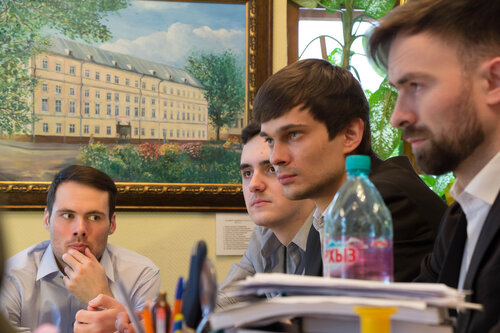UNIT 2 THE SCHOOL I GO TO
I. Vocabulary and Speech
Text
The School I Go To
I am Stepan. I am eight. I go to school and I am a second grade pupil. Let me tell you about the school I go to. I go to Modern Education School. It is situated in the centre of Moscow. I live in the centre of Moscow, too. It takes me 10 minutes to come to my school by bus.
I have been going to my school for 2 years now. My favourite subjects are English and Maths.
We are having an English class now. I am talking to my teacher. I am retelling my topic about our school.
1. Complete the sentences. Consult the text
2. Answer the questions by quoting the text
3. Make general questions to the sentences of the text
4. Translate the following
5. The teacher dictates the text. Put it down
6. Write a similar text about your school
7. Reproduce the text8. Speech Patterns. Classroom Vocabulary
Open your books at page 4...........–Ю—В–Ї—А–Њ–є—В–µ –Ї–љ–Є–≥–Є –љ–∞ —Б—В—А.4
Close your books ........................–Ч–∞–Ї—А–Њ–є—В–µ –Ї–љ–Є–≥–Є.
May I come in?.....................–†–∞–Ј—А–µ—И–Є—В–µ –Љ–љ–µ –≤–Њ–є—В–Є?
May I go out for a minute? .........–Я–Њ–Ј–≤–Њ–ї—М—В–µ –Љ–љ–µ –≤—Л–є—В–Є?
Could you repeat, please?.........–Я–Њ–≤—В–Њ—А–Є—В–µ –њ–Њ–ґ–∞–ї—Г–є—Б—В–∞.
Put on your headphones?..............–Э–∞–і–µ–љ—М—В–µ –љ–∞—Г—И–љ–Є–Ї–Є.
Go to the whiteboard!...................–Т—Л—Е–Њ–і–Є –Ї –і–Њ—Б–Ї–µ.
*9. Read, look up and say
"Hello. How are you?"
"Fine, thank you. And how are you?"
"I am very good. Thanks. Where are going?"
"I am going to my school."
"What school do you go to?"
"I go to Modern Education School."
II. Grammar and Phonetics
Grammar
to be–У–ї–∞–≥–Њ–ї to be –њ–µ—А–µ–≤–Њ–і–Є—В—Б—П ¬Ђ–±—Л—В—М¬ї –Є–ї–Є ¬Ђ–µ—Б—В—М¬ї. –°—Г—Й–µ—Б—В–≤—Г–µ—В –Ї–∞–Ї:
вАҐ —Б–Љ—Л—Б–ї–Њ–≤–Њ–є –≥–ї–∞–≥–Њ–ї;
вАҐ –≤—Б–њ–Њ–Љ–Њ–≥–∞—В–µ–ї—М–љ—Л–є –≥–ї–∞–≥–Њ–ї;
вАҐ –≥–ї–∞–≥–Њ–ї-—Б–≤—П–Ј–Ї–∞.
–°–њ—А—П–ґ–µ–љ–Є–µ –≥–ї–∞–≥–Њ–ї–∞ вАЬto beвАЭ –≤ Present Simple.
Grammar Exercises
III. Reading. Writing. Free Speech
1. Education in Finnland
School begins in August and ends in May. Lessons start at 9 am and usually end by 2 pm. Typically, pupils have 3 to 4 classes a day with a 75-minute length of each. Several breaks during the day are not only for a snack time. Pupils often have the same teacher for 6 years in a row. The education system in Finnland is considered to be one of the best in the world.
2. Education in the UK
School begins at the age of five. Children younger than five can go to nursery school. Pupils go to primary school (six years). Primary school in the UK is divided into infant school (the first two years) and junior school (the following 4 years). After primary school, students go to secondary school. The school year consists of three terms. Students have about 12-13 weeks of holiday per school year. At primary school, classes run Monday to Friday from about 9 a.m. to 3 p.m. There are usually between 25 and 35 pupils in one class. Typical subjects are English, Maths, Physical Education (PE), modern languages (French, German, Spanish).
3. Schools in Australia
School begins at the age of five. Schooling lasts for 13 years. Australian schools do more than just educate students. They prepare them for life.
The school year in Australia starts in either late January or early February. It ends in December. Schools have three or four semesters. Each term lasts 9вАУ11 weeks. Usually there are four holiday breaks between terms: in December (about six weeks) for Christmas, in April (two weeks) for Easter, and two more breaks in July and October (both also about two weeks). School hours are usually from 9:00 to 15:30. Lunch is eaten at school. English is the official language of instruction.
***
My name is Nicole. I am from Australia and I love my school! It is a school for artists. It's very small. There are seven boys and seven girls in my school. We've got really nice teachers. The students like them! There aren't any desks, pens or exercise books in my school. There are a lot of big tables and lamps. On the tables there are pension and paints: red, orange, brown, yellow, blue, green, white and purple. There aren't any black or grey paints there. Our teachers don't like these colours. I'm very happy in my school. There is a bus and a train to our school from Sidney.
4. Education in Russia
When a child turns 7 years old, she or he can go to a school (state or private). The academic year starts in September.
Hi, I am Yaroslav. I am a forth grade pupil. I go to Modern Education School. It is a private school. It is situated in the centre ogf Moscow. There is much English in our school. We speak English, we read English stories, we listen to disks, we work on grammar and phonetics and we write exercises.
We also play different English and Russian games and sing songs, too. I am thankful to my school.
***
Hello! ItвАЩs seven oвАЩclock. Monday morning. I hate it. IвАЩm not an early riser. School starts at 8 o'clock. It takes me 15 minutes to get to my school. My best friend lives in the suburbs of Moscow, thatвАЩs why I walk alone to my school.





